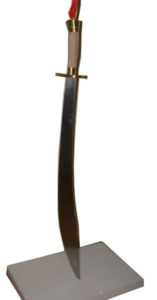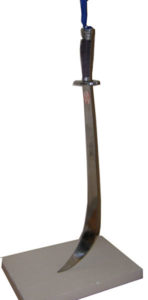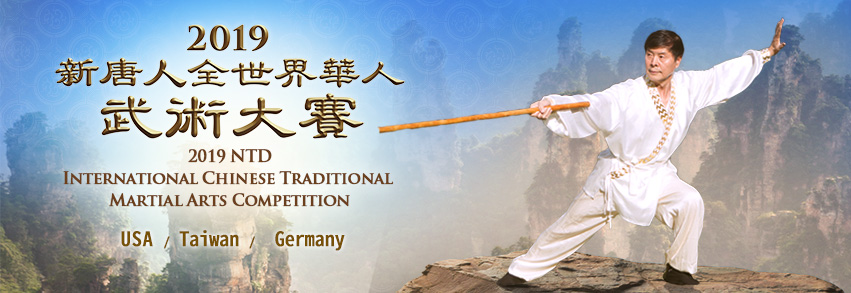FAQ
- 1. Why does NTD host the International Chinese Traditional Martial Arts Competition?
- 2. Who are the judges?
- 3. Are there any age requirement of the competition?
- 4. Why NTD encourage Chinese to participate in this competition?
- 5. What are the competition categories?
- 6. How many categories can a contestant register for?
- 7. The competition requires that an internal style form should be limited to 3 minutes and an external style form should be limited to 2 minutes. What will happen if the time required for my form is above or below such limit?
- 8. What is the requirement for weapons in this competition?
- 9. This competition requires Long Fist forms and Weapons to include their acrobatic techniques (i.e. single/double jump kick, spring kick, etc.) or acrobatics/flips (aerial cartwheel, spinning crescent kick or tornado kick, butterfly kick, etc). Is this a modern wushu requirement?
- 10. Why there is no Tachi(Tai Ji) category in this competition?
- 11. What are the information needed in an application package?
- 12. Why this competition ask contestant to fill out contestant resume form?
- 13. How to obtain visa to come to the US for North America Preliminaries and Semi-Finals/Finals?
- 14. As a contestant, are there anything I can do to help promoting the traditional Chinese martial arts besides joining the competition?
1. Why does NTD host the International Chinese Traditional Martial Arts Competition?
The mission of the “International Chinese Traditional Martial Arts Competition” is to bring forth the essence of Chinese martial arts, provide contestants with an opportunity to advance their martial arts skills, and help improve contestants’ moral conduct based on Martial Arts principles. The competition also aims to promote traditional Chinese culture and display true martial arts values to the world.
2. Who are the judges?
The panel of judges for this Competition is composed of highly experienced Chinese Martial Arts experts.
NTD is the world premier independent Chinese media. It has no direct relationship with any particular martial arts associations or organizations. NTD’s martial arts competition provides a great platform for all schools of traditional Chinese martial arts to showcase their heritage and talents. In order to ensure the fairness of the competition, NTD does not release the details of judge panel prior to the competition. We discourage any contestants to contact competition judges prior to the date of the competition.
3. Are there any age requirement of the competition?
Age requirement is 10-60. If a contestant’s age does not meet this requirement, the contestant may still apply. However, the contestant must include his/her martial arts experience and physical condition in the application in order for the judging committee to consider his/her candidacy.
4. Why NTD encourage Chinese to participate in this competition?
The International Chinese Traditional Martial Arts Competition is part of the Global Chinese Competition Series hosted by NTD. One major mission of the NTD Chinese competition series is to help Chinese people return to their authentic cultural roots. The modern Chinese history is full of painful turmoil. After the Chinese Communist Party (CCP) took over Mainland China in 1949, the regime has used various means to wipe out many aspects of traditional Chinese culture. Chinese Martial Arts in particular has gone through an unprecedented tribulation. Traditional martial arts masters were labeled as “superstition promoters” and were brutally persecuted. During the “Great Cultural Revolution (1966 – 1976)”, many of them were forced into hiding; some were sent to labor camps or prisons; some were even murdered. In addition, the CCP’s global promotional efforts of “modern Wushu” have also impeded the transmission of traditional martial arts.
As the social and cultural environment for the passing of genuine traditional martial arts was destructed , many Chinese people have even lost comprehension of the profound cultural content of martial arts. Since many of the traditional martial artists are not teaching in public or cannot find suitable students to pass on their art, many precious traditional forms have been lost or are in danger of becoming extinct. Currently, it is extremely difficult for the surviving traditional martial artists to find space to expand, develop, or pass on their teachings in mainland China. Outside of China, Chinese people have ironically become the minority practicing and cherishing traditional martial arts, one of the crown jewels of their own culture. NTDTV is now providing this competition as an opportunity for the global Chinese community to rediscover their own cultural identity. We hope Chinese martial artists from all walks of life will participate in the competition. Together, we hope to bring forth the essence of traditional Chinese martial arts values and techniques for generations to come.
5. What are the competition categories?
A) Fist Category (divided into male and female divisions): includes Long Fist styles such as Cha Quan, Hua (flower) Quan, Pao Quan, Hong Quan, Hua (China) Quan, Shaolin, etc. It also includes other external fist styles such as Mian Quan, Tong Bei, Praying Mantis, Fanzi Quan, Ba Chi Quan (Eight Extremes Fist), etc. and internal fist styles such as Ba Gua, Xing Yi, etc.
B) Southern Fist Category: includes southern fist styles such as Hung Ga, Lau Ga, Choy Ga, Li Ga, Mok Ga, Buddha Style, Crane Style, Wing Chun, etc.
C) Weapon Category(divided into male and female divisions): includes external weapons such as Sword, Broadsword, Spear, Staff, etc., and internal weapons such as Xing Yi Sword, Xing Yi Broadsword and Xing Yi Spear, as well as Yuanyang Blades, Qian Kun Circular Blades, etc.
6. How many categories can a contestant register for?
Each contestant can apply up to two categories for the preliminary round of this competition. Only one form is allowed for each category. Based on the score of the preliminary round, a contestant can only advance to the semi-final round in the category with better score.
7. The competition requires that an internal style form should be limited to 3 minutes and an external style form should be limited to 2 minutes. What will happen if the time required for my form is above or below such limit?
We require each form to include most of the traditional techniques of the related style. Exceptions to the duration limit requires advanced approval upon registration.
8. What is the requirement for weapons in this competition?
Contemporary Wushu soft metal weapons are inappropriate for this competition. Use the following method to test whether a weapon is appropriate or not: Put the sword or broadsword vertically on a hard surface with the tip supporting the weight of the weapon. If the weapon bends over 20%, then it is not qualified.
Also, hidden weapons, and rope/chain weapons (such as rope dart, meteor hammer, etc) are not suitable for this competition.
Weapons like nine-section whip, three-section staff, etc, are appropriate.
 |  |
| Weapon that is appropriate | Weapon that is NOT appropriate |
9. This competition requires Long Fist forms and Weapons to include their acrobatic techniques (i.e. single/double jump kick, spring kick, etc.) or acrobatics/flips (aerial cartwheel, spinning crescent kick or tornado kick, butterfly kick, etc). Is this a modern wushu requirement?
The jumps and acrobatic techniques in traditional Chinese martial arts are fundamentally different from those in modern wushu. They have strict requirement in take off and landing. The movements before and after the jump are also required to have stable stance. The jumps themselves have battle application. This is fundamentally different from the simple athletic requirement of modern wushu.
10. Why there is no Tachi (Tai Ji) category in this competition?
Because the backgrounds of various Tachi systems are fairly complicated, and they normally require longer time to compete, thus, this competition does not include Tachi.
11. What are the information needed in an application package?
- 1) All applicants must fill out the Registration Form (downloadable at “Competition Application”)
- 2) All applicants may also fill out the Contestant Resume Form (including personal martial arts experience and past awards). Please also provide photocopies of all awards for validation.
- 3) Contestants must submit two 1×1 inch color photos and a photocopy of a valid ID. A digital file of the photo is preferred.
- 4) All forms must be legible, signed and filled out in their entirety.
- 5) The forms can be mailed to the Competition’s Organizing Committee via registered mail. All mailed information is non-returnable.
12. Why this competition ask contestant to fill out contestant resume form?
NTD is working hard to promote traditional martial arts. The descriptions of schools and systems in the resume can not only help NTD in its martial arts promotion effort, but also help its reporters to better report on the winners.
13. How to obtain visa to come to the US for North America Preliminaries and Semi-Finals/Finals?
1) Usually your passport should not expire in six months.
2) Some general rules are listed below. For details, please visit
http://travel.state.gov/visa/visa_1750.html
If you already have visa or official travel document to come to the US, you do not need to apply for visa specifically for this competition.
If you are a citizen of the following country/region, visa may not be needed to come to the US:
Andorra, Australia, Austria, Belgium, Brunei, Denmark, Finland, France, Germany, Iceland, Ireland, Italy, Japan, Liechtenstein, Luxembourg, Monaco, the Netherlands, New Zealand, Norway, Portugal, San Marino, Singapore, Slovenia, Spain, Sweden, Switzerland, United Kingdom
Please note that the usually a citizen of the above country/region with machine-readable passport can stay in the US for less than 90 days without a visa. Otherwise, visa is still needed.
3) Normally Canadian citizens do not need visa to visit the US.
4) Citizens of other nations usually need B-type visa to visit the US.
If a contestant needs visa to come to the US, please contact the NTD registration office to obtain an invitation letter as soon as you complete the registration process. Different countries have different process time to get a visa. Please contact your nearest US consulate or embassy for processing details.
14. As a contestant, are there anything I can do to help promoting the traditional Chinese martial arts besides joining the competition?
We encourage all contestants to submit videos and/or articles to help NTD better promote culture and martial arts. Please note that upon submission of such materials, a contestant will grant NTD the right to use them in its program.

